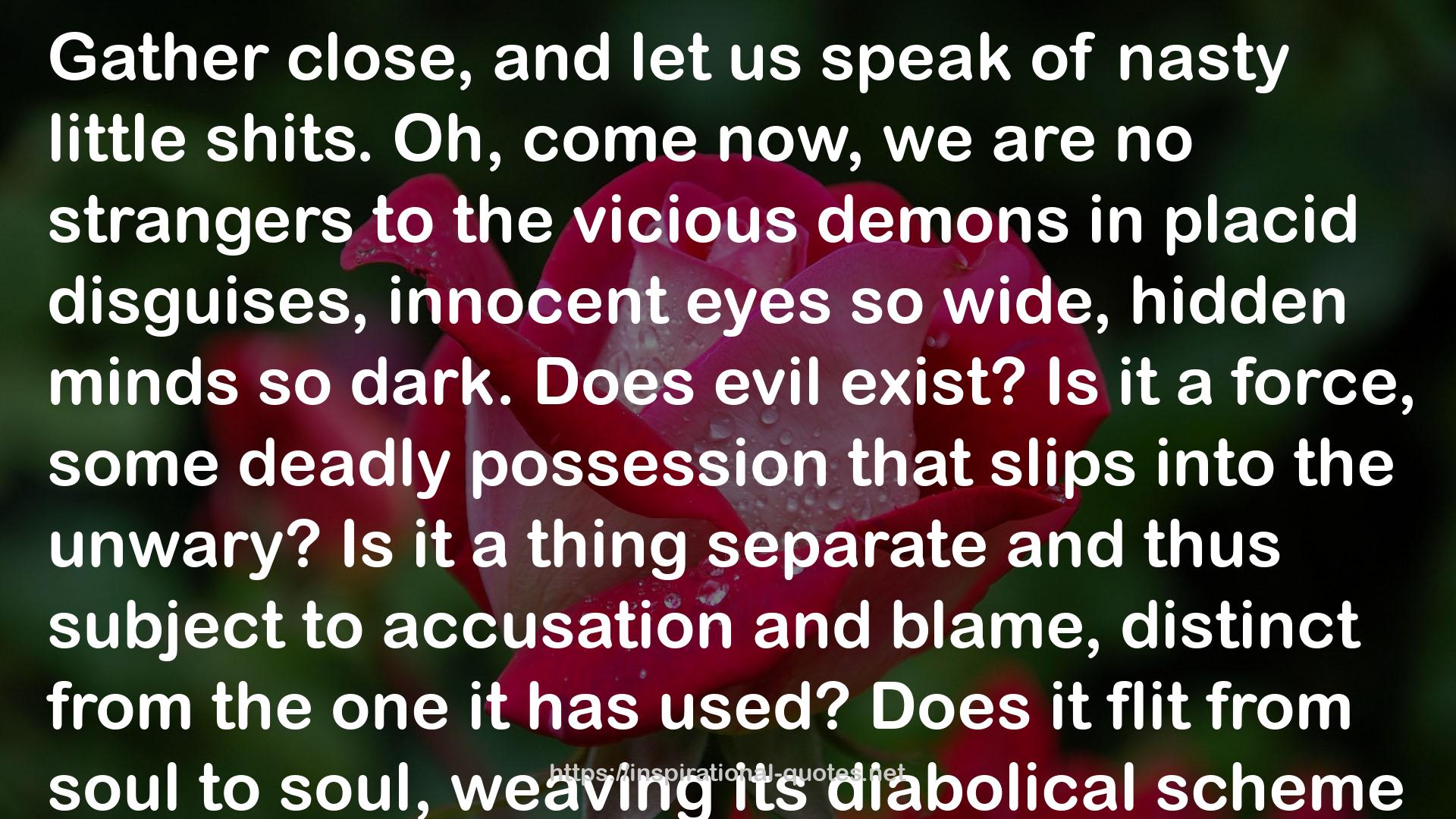1
" Gather close, and let us speak of nasty little shits. Oh, come now, we are no strangers to the vicious demons in placid disguises, innocent eyes so wide, hidden minds so dark. Does evil exist? Is it a force, some deadly possession that slips into the unwary? Is it a thing separate and thus subject to accusation and blame, distinct from the one it has used? Does it flit from soul to soul, weaving its diabolical scheme in all the unseen places, snarling into knots tremulous fears and appalling opportunity, stark terrors and brutal self-interest? Or is the dread word nothing more than a quaint and oh so convenient encapsulation of all those traits distinctly lacking moral context, a sweeping generalization embracing all things depraved and breath takingly cruel, a word to define that peculiar glint in the eye—the voyeur to one’s own delivery of horror, of pain and anguish and impossible grief?
Give the demon crimson scales, slashing talons. Tentacles and dripping poison. Three eyes and six slithering tongues. As it crouches there in the soul, its latest abode in an eternal succession of abodes, may every god kneel in prayer.
But really. Evil is nothing but a word, an objectification where no objectification is necessary. Cast aside this notion of some external agency as the source of inconceivable inhumanity—the sad truth is our possession of an innate proclivity towards indifference, towards deliberate denial of mercy, towards disengaging all that is moral within us.
But if that is too dire, let’s call it evil. And paint it with fire and venom.
There are extremities of behaviour that seem, at the time, perfectly natural, indeed reasonable. They are arrived at suddenly, or so it might seem, but if one looks the progression reveals itself, step by step, and that is a most sad truth. "
― Steven Erikson , Toll the Hounds (Malazan Book of the Fallen, #8)
6
" Some thoughts, possessing a frightening kind of self-awareness, knew to hide deep beneath others, riding unseen the same currents, where they could grow unchallenged, unexposed by any horrified recognition. One could always sense them, of course, but that was not the same as slashing through all the obfuscation, revealing them bared to the harsh light and so seeing them wither into dust. The mind ran its own shell-game, ever amused at its own sleight of hand misdirection – in truth, this was how one tended to live, from moment to moment, with the endless exchange of denials and deference and quick winks in the mirror, even as inner proclamations and avowals thundered with false willpower and posturing conviction. "
― Steven Erikson , Toll the Hounds (Malazan Book of the Fallen, #8)
8
" Many adults, in the indurated immobility of years, acquire a fear of places they have never been, even as they long for something different in their lives, something new. But this new thing is a world of the fantastical, formless in answer to vague longings, and is as much defined by absence as presence. It is a conjuration of emotions and wishful imaginings, which may or may not possess a specific geography. Achieving such a place demands a succession of breaks with one's present situation, always a traumatic endeavour, and upon completion, why, sudden comes the fear. "
― Steven Erikson , Toll the Hounds (Malazan Book of the Fallen, #8)
12
" To live a hard life was to make solid and impregnable every way in, until no openings remained and the soul hid in darkness, and no one else could hear its screams, its railing at injustice, its long, agonizing stretches of sadness. Hardness without created hardness within.
Sadness was, she well knew, not something that could be cured. It was not, in fact, a failing, not a flaw, not an illness of spirit. Sadness was never without reason, and to assert that it marked some kind of dysfunction did little more than prove ignorance or, worse, cowardly evasiveness in the one making the assertion. As if happiness was the only legitimate way of being. As if those failing at it needed to be locked away, made soporific with medications; as if the causes of sadness were merely traps and pitfalls in the proper climb to blissful contentment, things to be edged round or bridged, or leapt across on wings of false elation.
Scillara knew better. She had faced her own sadness often enough. Even when she discovered her first means of escaping it, in durhang, she’d known that such an escape was simply a flight from feelings that existed legitimately. She’d just been unable to permit herself any sympathy for such feelings, because to do so was to surrender to their truth.
Sadness belonged. As rightful as joy, love, grief and fear. All conditions of being.
Too often people mistook the sadness in others for self-pity, and in so doing revealed their own hardness of spirit, and more than a little malice. "
― Steven Erikson , Toll the Hounds (Malazan Book of the Fallen, #8)

